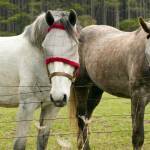Dealing with Flies on Horse Properties

Summer and fall are fly seasons around horse barns and pastures. Flies seem to be everywhere, aggravating horses and upsetting their normal grazing and rest times. Horsefly stings are unpleasant for the horse, who may buck or bolt, and the rider, who may suddenly be left riding only air. Add the fact that some flies are links in the spread of disease, and it’s hard to find anything positive to say about the hovering, humming, hungry hordes.
Fortunately, there are many weapons in the fight against flies. Beginning early in the spring, property managers can take steps to minimize fly populations. This mainly involves using common sense to make the property unattractive to flies. Be sure all animal feed is kept in closed, rodent-proof containers, and clean up spills right away. Urge horse owners to put trash such as empty soft drink cans in a covered garbage can. Drain or fill areas that hold standing water. Keeping stalls and pastures free of manure also helps, as does the use of commercially available fly predators (these can be amazingly effective).
Manure piles are fly magnets! Think about arranging to have manure hauled away on a regular basis. In the meantime, cover manure piles with sheets of heavy-gauge clear plastic, and weight the edges of the plastic so it won’t blow away. Be sure to allow some air flow around the pile to avoid an unsafe buildup of heat from decomposition.
You’re bound to have some flies around, no matter how many measures you take to limit their numbers. Some ideas to give your horses a more comfortable summer and fall are:
- Use fly traps outside the barn (putting them inside may draw flies in).
- Consider using a feed-through fly control product that will inhibit the development of adult flies in horse manure.
- Most horses tolerate mesh fly masks that cover the eyes and face. You can also buy fly guards for the horse’s legs and body.
- Finally, use fly sprays or wipes on the horse, at least while you are riding or having veterinary or farrier work done.








